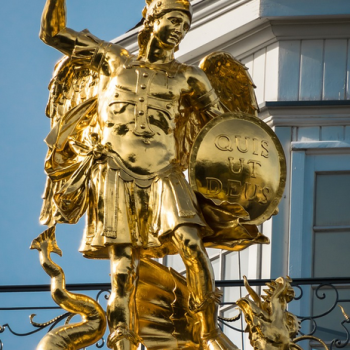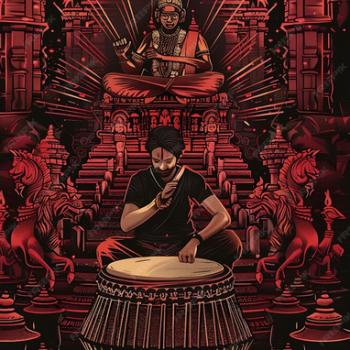Of all the things that separate the members of different religions, perhaps the most challenging is the notion that others believe in a “different” God. And by different I mean false. Jews, Christians and Muslims are very adamant about monotheism. However, many theologians agree that in ancient times, Jews did believe in the existence of other deities. The difference was that theirs was the best, and with whom they had a covenant.
The vast majority of Christians and Jews will acknowledge that the God they worship is the same entity. When one adds Islam into the mix the numbers aren’t as close. There are a couple of reasons for this. The primary one is that more than half of the Christian Bible is the entire Hebrew (Jewish) Bible. A great deal of the nature of God is shared. Of course, one significant difference is the concept of the Trinity. Jews believe in a very unitary deity. Christians claim that God is simultaneously unitary, but made up of 3 separate “persons.” This includes Jesus, who is believed to be both fully human and divine. In the early days of Christianity there was a movement called Marcionism, that wanted to rid the religion of all things Jewish. But that was labeled a heresy, and what we call Christianity today continues to claim the God of the Jews as their God as well.
ISLAM
Muslims believe that the Bible is a rather corrupted version of cosmic truths. The Qur’an shows us a deity that is quite a bit like the one of the Hebrew Bible. And even though Arabic speaking Christians refer to this entity as Allah, many more conservatives believe that the One worshipped by Muslims is a “false” God. This view is not shared by more liberal Christians. They point to the fact that all 3 religions acknowledge themselves as progeny of the prophet Abraham. They are willing to live polite disagreement with the Muslim doctrines that cast Jesus as a less-than-godlike prophet who is no greater in spiritual stature than Abraham, Moses, Noah or Mohammad.
There are still Muslims who refer to Christians as polytheists due to their belief in the Trinity. But my experience tells me that many, perhaps a majority who live in the West, are more generous toward their Christian neighbor in this regard.
Even though Jews and Muslims have been in conflict for centuries, the religions tend to respect the fierce monotheism of the other. Rabbis of the past have claimed that a Jew can pray in a mosque, but not a church. And many Jews will eat meat that has been harvested with Muslim ritual when kosher food in not available.
AND OTHERS?
So, while there are no single voices that speak for these faiths, we can say that a great number of Christians, Jews and Muslims tend to agree that when one of them uses the word “God” to describe the One Universal Power, they are speaking of the same entity, even though there is great disagreement as to the nature of Him (always a Him).
So, what about Hindus? Can we say that Hindus believe in “the God of the Bible?” Well, like many questions in the Dharma, it depends.
There is no question that the vast number of Jews, Christians and Muslims would vigorously disagree with the idea that Hindus conceive of Divinity in a similar way that they do. Hence, they will easily state that no, Hindus have a “different” God. Or gods. Or goddesses. As with most questions this deep, we may come up with several different, honest answers.
A WIDE VARIETY
We must start with the understanding that there is no absolutely monolithic concept of God in Hinduism. But for simplicity’s sake, allow me to address this from the standpoint of Advaita Vedanta. While this theology allows for devotees to venerate a particular form of the formless (Ishtadevata), it claims that the Ultimate Reality is Brahman, which is undifferentiated, pure, impersonal Consciousness. The main difference between Brahman and Yahweh/Allah is that the latter created the world and all inhabitants as things outside of Him. But Brahman didn’t create anything. It expanded Itself to become that what we call creation. Brahman exists both within Its manifestation and beyond it. An Abrahamic would agree that, say, “God is in this room.” A Hindu would counter with “God is this room.”
AND YET…
What we do agree on is that ultimately, there is only One. One Causeless Cause or Prime Mover. While having polytheistic elements, all roads lead back to a Cosmic Unity. Now, if there is consensus that there is just “one God,” how can we say that we “worship” different Gods? For example, let’s say that both Prof. Smith and Prof. Jones write books on Abraham Lincoln. Smith’s take on our 16th president tends to indicate that he was erratic, angry, perhaps even bisexual.
But the book published by Jones makes different, opposite claims. Here, Abe is emotionally stable, humorous, and clearly heterosexual. We know that historians will argue about these biographies. And in their conversations, they will refer constantly to “Smith’s Lincoln” and “Jones’ Lincoln.” They will discuss Lincoln almost as if he is 2 people. But we know that they fully understand that just one person is being analyzed. So, one way to deal with the God of the Vedas, the God of the Bible and the God of the Qur’an is similar to this process. We might think that those holding other theologies have an incorrect concept of God, but be generous enough to withhold the appellation of “false God” when comparing the spirituality of others with our own.













